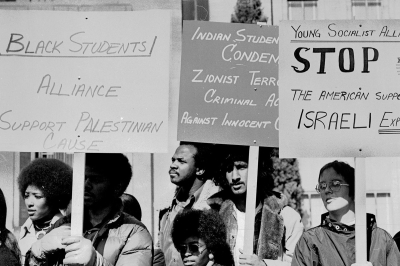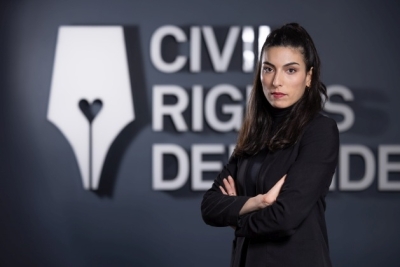WASHINGTON DC, Jan 03 (IPS) — In its military campaign in Gaza, Israel faces a seemingly endless list of alleged human rights violations. International monitors argue the Israel Defense Forces have starved Gazans, targeted journalists attempting to cover the carnage, tortured detainees, and attacked hospitals full of wounded civilians.
The U.S. — a passionate backer of civilian protections in Ukraine — has struggled to find the right way to address these claims while still standing by its long-time partner. The bombing has been “indiscriminate,” says President Joe Biden, but perhaps it will improve tomorrow. Killing more than 10,000 women and children in two months is not “genocide,” argues White House spokesperson John Kirby, but Hamas’ brutal Oct. 7 attacks were.
If human rights are fundamentally a matter of world consensus, then what does it tell us that the United States threatens to cast a second veto against a United Nations Security Council resolution begging for a humanitarian suspension of fighting?
What does it mean when a supposed champion of human rights seems to jettison them when it becomes inconvenient? For that matter, why should Israel care about human rights when it perceives its fight as existential?

Kenneth Roth has a unique perspective on these questions. Roth, considered by many to be a dean of the human rights movement, spent nearly three decades as the executive director of Human Rights Watch before stepping down last year to become a visiting professor at Princeton University.
Under his leadership, HRW drew flak for, among other things, declaring Israel’s occupation of Palestinian territories to be apartheid, all while documenting in meticulous detail abuses committed by Palestinian groups, including Hamas.
RS spoke with Roth to get his thoughts on human rights at a time of crisis. The following conversation has been edited for length and clarity.
Responsible Statecraft (RS): How would you rate the Biden administration’s handling of the Gaza crisis from a human rights perspective?
Roth: The Biden administration has been far too deferential to the Israeli Government, despite the pretty clear commission of war crimes in Gaza. And while the administration has pushed to ameliorate some of those war crimes — by pressing for humanitarian access, by urging greater attention to avoiding civilian casualties — that rhetorical push has not been backed by the use of the leverage that the administration has that might have really put pressure on the Israeli government to stop, whether that would be withholding or conditioning ongoing arm sales or military assistance, or even allowing a Security Council resolution to go forward.
RS: What would a better approach look like?
Roth: The initial problem was that Biden pretty unconditionally wrapped himself in the Israeli government’s response to the horrible October 7 attacks by Hamas. If you look at his initial comments, while there were caveats written in about the need to respect humanitarian law, there was no emotional punch behind them.
It was pretty clear that Biden simply stood with Israel and was giving it a green light to proceed with its military response to Hamas without much effort, at least during the first few weeks, to ensure that that response really did comply with humanitarian law. So, I think the Israeli government got the message that the references to humanitarian law were necessary for certain audiences, but that the administration’s heart was not in them.
RS: Would a more forceful form of messaging at the start have led to different results?
Roth: Obviously, it’s hard to know the counterfactual. But the U.S. government, which has the greatest leverage of any external actor, didn’t really use that leverage to ensure that its periodic rhetorical commitment to the need to respect humanitarian law was matched by its much more forceful embrace of the Israeli military response to Hamas.
RS: I’ve seen some reporting that the State Department has done internal inquiries as to whether U.S. officials could be legally complicit if Israel is found to have committed war crimes in Gaza. Do you have any thoughts on that question?
Roth: Well, they could be. Biden’s references to the Israeli military conducting indiscriminate bombing were clearly not just a verbal slip. It probably reflected the internal conversations that the administration has. The second one even seems to have been somewhat deliberate.
And the significance of that is that indiscriminate bombardment is a war crime. As any administration lawyer would know, continuing to provide weapons to a force that is engaged in war crimes can make the sender guilty of aiding and abetting war crimes.
That is not some crazy, wacko theory. That was the basis on which former Liberian President Charles Taylor was convicted by an internationally backed tribunal, the so-called Special Court for Sierra Leone, for providing weapons to the Sierra Leonean rebel group known as the Revolutionary United Front, a group that was notorious for chopping off the limbs of its victims.
Because Taylor kept providing arms in return for the RUF’s diamonds while he knew the RUF was committing these war crimes, this internationally-backed tribunal found him guilty of aiding and abetting, convicted him, and sentenced him to 50 years in prison, which he is currently serving in a British prison.
RS: My next question is a little tricky, but I’m curious how you approach it. Israel claims that this war is a fight for its very survival. Why should a country that views itself as being in that position care about respecting human rights?
Roth: Well, I think the question is why should it care about adhering to international humanitarian law and protocols. It’s worth noting that humanitarian law was not drafted by a bunch of human rights activists and peaceniks. This was drafted by the world’s leading militaries. It was designed for war, for situations where governments often feel that they are existentially at risk, and these were the limits that the world’s leading militaries imposed on themselves. Israel has signed on to these standards, and it claims to abide by them. It has many capable lawyers who could be applying them. It just isn’t applying them.
It probably requires a certain psychological analysis to figure out why, but some of the signals being sent from the top indicate a willingness to disregard the requirements of humanitarian law. When you have Defense Minister Galant referring to the residents of Gaza as “human animals,” when you have Netanyahu invoking the biblical story of Amalek in which there’s a divine injunction to not spare the men, women, children, or animals, these are not-so-subtle signals that the top political and military leadership in Israel doesn’t care that much about civilian casualties. This has seemed to have manifested itself in the indiscriminate and disproportionate attacks that the Israeli military has carried out in Gaza.
RS: It seems to me that focusing on war crimes or potential war crimes can sometimes lead to really bad policy outcomes. In this case, Israel is really spotlighting Hamas’ alleged war crimes. You think back to the war in Iraq, where there was a lot of highlighting of Saddam’s alleged war crimes. How can advocacy for human rights avoid supporting unfettered militarism?
Roth: First, I think it’s important to note that war crimes by one side do not justify war crimes by the other. If a warring party could cite the other side’s war crimes, you would quickly have no more Geneva Conventions because allegations of war crimes are often made in the passions of conflict. The fact that some people have committed war crimes — in this case, both sides — doesn’t justify that others resort to criminal conduct. Now, in terms of military action, few people contest that Israel had every right to respond to Hamas’ military attack. It was an extraordinarily lethal military attack. It was ruthless, with widespread murder, rape, abduction, and indiscriminate bombardment. So with an attack of that sort, no one should be surprised that the Israeli government responds. The only real question was, will it respond consistent with humanitarian law? Or would it flout that law?
RS: What does all this mean — especially the fact of the U.S. seemingly taking a step back in advocacy for the protection of human rights — what does all this mean for the state of human rights today?
Roth: It is harmful because the U.S. government is such a powerful voice, and when it does seem to make an exception in its human rights advocacy for a close ally like Israel, it discredits the U.S. as a voice for human rights around the world. Now, I should say this is not the only instance of inconsistency on the part of Washington. We’re seeing it as well as the Biden administration tries to build alliances to oppose Russia’s invasion of Ukraine or to contain China. So while the administration has spoken numerous times about its fundamental commitment to human rights, it’s been a very inconsistent commitment. And that inconsistency is probably most visible in the Middle East, which has been essentially a black hole in the administration’s human rights policy. It’s very difficult to be so permissive of human rights violations in one region of the world and have a whole lot of credibility on human rights in other parts of the world.
This means that one of those powerful voices we have has weakened itself. It’s not the first time that has happened. Under Trump, the U.S. essentially abandoned any pretense of enforcing human rights. Prior administrations have had comparable inconsistencies. The U.S. still has been able to be a useful voice for human rights, despite these inconsistencies, in some cases, but it is a much weaker voice than if it had really been principled and consistent.
RS: How do you see the future of the push to get states to protect human rights? Are we in a moment of crisis that galvanizes change?
Roth: If you look at the various efforts to uphold human rights, they’ve been quite vigorous in certain cases. There has been a very strong response to Russian war crimes in Ukraine, complete with multiple General Assembly resolutions, the Human Rights Council standing up a commission of inquiry, the International Criminal Court launching an immediate investigation and actually charging Putin and one of his aides with war crimes.
A place where it’s been weaker has been, say, China’s crimes against humanity against the Uyghurs and other Turkic Muslims in Xinjiang, where we came within two votes of putting on the agenda a discussion of then-UN High Commissioner for Human Rights Michelle Bachelet’s very strong report on what she called possible crimes against humanity. But we didn’t even get that agenda item, so that’s a place where the world has been much weaker.
But there’s been greater mobilization, greater willingness to speak out on a range of other situations, whether that be Myanmar or Iran, Saudi abuses in Yemen for a time, Sudan, Ethiopia for a time, Venezuela, Nicaragua. So the idea that because there’s this black hole in U.S. human rights policy, therefore nothing can get done, that’s just not true. A lot gets done, but the defense of human rights is weaker because the U.S. has been an inconsistent supporter of the effort.
Source: Responsible Statecraft (RS)
Connor Echols is a reporter for Responsible Statecraft. He was previously an associate editor at the Nonzero Foundation, where he co-wrote a weekly foreign policy newsletter. Echols received his bachelor’s degree from Northwestern University, where he studied journalism and Middle East and North African Studies.
The views expressed by authors on Responsible Statecraft do not necessarily reflect those of the Quincy Institute or its associates.
IPS UN Bureau






